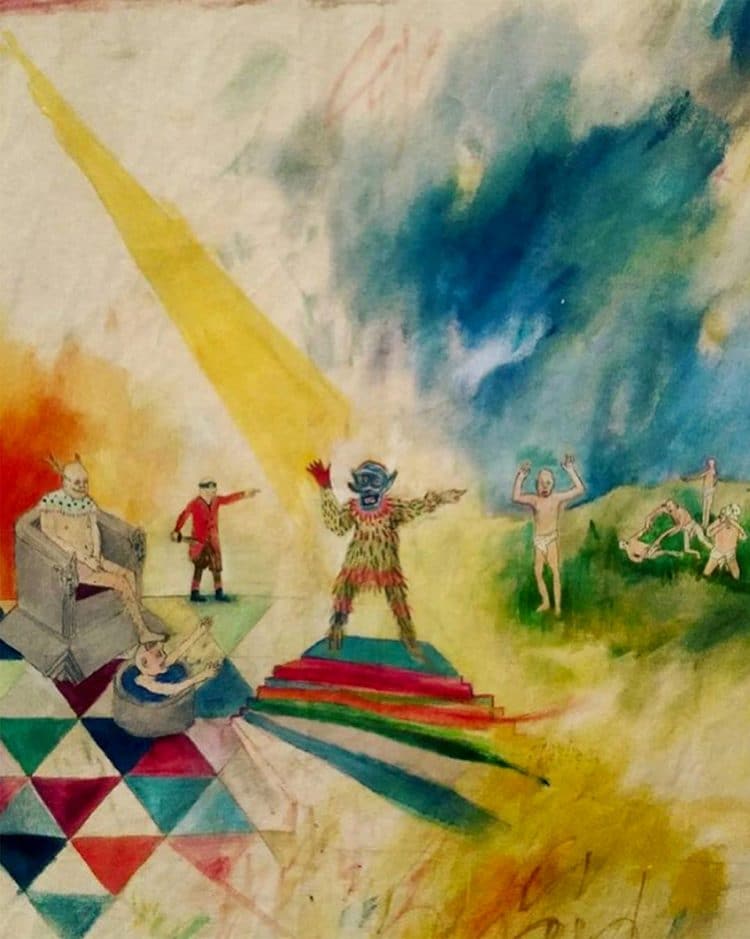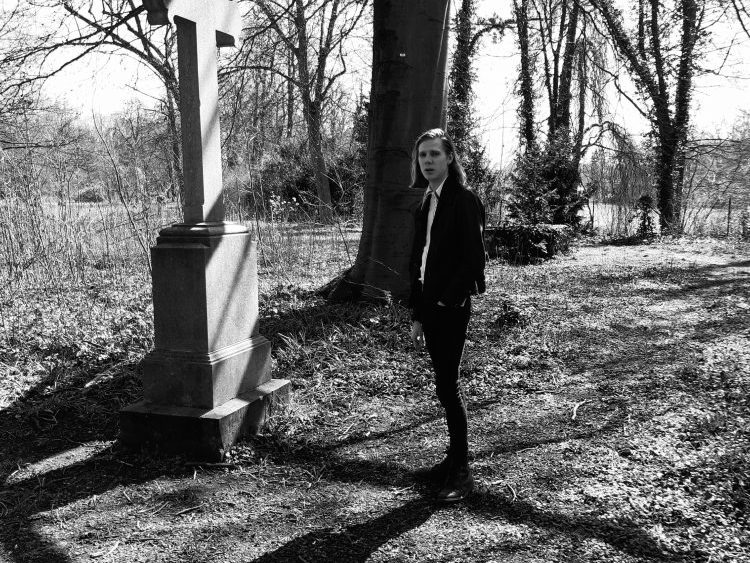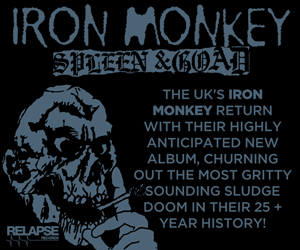In 2016 I was surprised when a group from New Zealand called Trust Punks, who had previously come onto my radar after a tour of Australia, released what I would have called one of the best records of that year, Double Bind, on the great New York label Wharf Cat. I wondered what had happened to them and was pleasantly surprised when local label Urge Records announced a new band featuring Joseph Trotman, singer and guitar player (one of a few) of Trust Punks had a new project called Dead Finks coming out with a tape called ‘Dead Fink Era’.
Dead Fink Era is the first release from the band. It does feel somewhat like a continuation of a different kind of post-punk that he had previously experimented with on Double Bind. However, this time, much more concise. There is less meddling on jamming krautrock or Einstürzende Neubauten, there isn’t as much analysis the state of politics. Instead, it feels like we are taking a look inside of how his brain might work. A coagulation of influences from Wire to Swell Maps to New Order to Yellow Magic Orchestra. Similarly Joe and his partner Erin (who also plays bass in Dead Finks) move to Sydney creating, definitely, a change of sound. I hear similarities to the great bands who have come out of our desolate rock down under, from Total Control or Low Life, it’s a desperate sound. One that sounds familiar yet entirely new. From the biting single ‘Bitter Pill’ to the dance in your living room sound of ‘Cheerleader’ Dead Fink Era is riddled with anxiety and melancholy. A perfect summation of our modern lives inside on quarantine.

I spoke to Joe about the new release, COVID-19 and moving a band across the world.
On Dead Fink Era you go between two very different genre styles – those being sharp, a sort of post-punk ala Wire, Swell Maps etc to something reminiscent of pop synthesiser music of the 80’s, why? What is that process like and why did you choose to do the album like this? Was there anything in particular you were reading or listening to that really informed this decision?
I think when we were first writing and recording these songs, we just had a lot of different ideas about how we wanted to sound. At first I sort of thought I had ideas for several different projects that we would work on simultaneously, but eventually we realised that channelling them all into one band made the most sense and could end up sounding interesting. I have always been a fan of artists who go in a lot of different directions and maintain a sense of unpredictability so I guess I wanted to emulate that a bit. I was listening to a lot of music that was made by one or maybe two people, that you could tell had a really bold and singular vision behind it, without regard for things like “genre” or “fidelity” or “songs” lol….. Stuff like Dirty Beaches, Dean Blunt, Cindy Lee, John Maus….
A lot of the lyrics on the record sound very self reflective, especially on the catchier, synthesizer tracks like Sleepwalking and Cheerleader. Can you talk a little bit about the therapeutic process of songwriting or what you hope a listener to take out of these tracks?
Those songs required me to actually “sing” a bit more, whereas I’m used to sort of just yelling over a guitar track, which comes a bit more naturally to me. Maybe the physical process of trying to make the vocals quieter and more melodic led to me feeling a bit more vulnerable and I channelled that through the words a little bit. I don’t think it was therapeutic really, there are times when I still feel borderline embarrassed of those vocals/lyrics and the songs in general! But I do hope someone gets something out of them, although I don’t think there’s any way for me to know how or what that would be.
How did a lot of these songs come together?
The songs with live drums were worked out as a band; me, Erin and our friends Jai Love and Jack de Lacy. The songs with a drum machine were done by me and Erin in Ableton, just kind of chipping away at things, layering them piece by piece over a year or two and kind of learning how to use the synths and software as we went along.
What was different about this project than others you’ve been involved with?
In previous bands, I was usually one of four or five people who all had a hand in the songwriting, and I never handled any of the production. In Dead Finks there is often only one other person to bounce ideas off and as we are often recording ourselves and using electronics, I have had to learn a little bit more of the technical stuff. Basically I have a bit more control over DF, which is a blessing and a curse!
You’re now based in Berlin but a lot of these songs were written and recorded in Australia. How did your time in Sydney and the Australian scene influence this project?
I think when Erin and I moved to Sydney from Auckland in mid-2015 we came at quite a good time for the music scene there. There were a bunch of newer bands, all kind of loosely associated with a label called Paradise Daily that were doing interesting stuff, kind of melding electronic music and punk music in a way that probably had a big influence on what we have gone on to do.
Why did you move to Berlin and what does that mean for the band moving forward?
We just had a few friends and family here and weren’t really up to much in Sydney, so we came to check it out and ended up really liking it so we have stayed! The idea was to get some new people involved with the band and start touring Europe eventually, but it took a bit longer than we expected to get our shit together and find the right people to join. Now, right as it was starting to come together, this pandemic has hit so…..
There are these long expansive soundscape-like tracks. Something that I noticed was also used in one of your previous bands Trust Punks. Do these serve some greater purpose to you? And do you want to take a moment to talk about how you physically recorded a lot of this record because the way you did it I think definitely creates a collage like effect in the finished product.
I think after a while you just get bored of writing songs with a verse and a chorus and a bassline and a beat and all that shit….. Abandoning that stuff occasionally can be pretty liberating.
As for how we recorded it, a lot of it was done with a single mic, a practice amp, a cheap two channel interface, a Roland Groovebox thingy and a cracked version of Ableton 9. We had zero idea what we were doing and just hammered away at things by trial and error until it sounded vaguely listenable. I then brought it to a friend of mine here in Berlin called Lawrence Goodwin and he did some more mixing on most of the songs, which improved them quite a bit as he is a bit of a whiz.
There’s a lot of people now who are often replicating bands of the past. “Worship bands” or essays on “hauntology” – Mark Fisher used the latter to describe a pervasive sense in which contemporary culture is haunted by the “lost futures” of modernity, which failed to occur or were cancelled by postmodernity and neoliberalism. What’s your take on this and what do you think about the importance of appearing to be doing something original in 2020?
Honestly I have often worried that my music is too derivative. But I have started to realise that a lot of what people value as “originality” in art and music are things that artists often just stumble into without necessarily trying to do something unique or original, they just had the drive to make something, and by chance or by virtue of what made them interesting as a person, they created something interesting. If you start trying too hard to be clever you are either never going to get anything done or make something self-conscious and pretentious. So now I just try not to think about it too much, I just focus on creating for the sake of it and I hope that it turns out okay. I haven’t read the Fisher hauntology stuff, just his Capitalist Realism book. But I think a lot has changed already since he wrote it, especially now with this pandemic. I think the end of capitalism, for example, has become slightly less hard to imagine, it’s one of many possible eventual outcomes of the chaos the world is descending into. I would hope that the pervading sense of ennui that Fisher talks about in Capitalist Realism and that sense of having the future cancelled may dissipate now though, as for me at least, the feeling has changed from one of fatalism to one of confusion and uncertainty, which I think you could argue is more likely to result in social change? How this reflects/will reflect itself in contemporary art and music is something I am not qualified to comment on. Anyway, to be honest I don’t really have a problem with the current state of music in general. You’re always going to have boring garage bands or whatever, but I think there’s a ton of interesting and innovative stuff being made right now too.
A very topical question but how will the state of the world right now, in the middle of a global pandemic, affect art? The act of making this sort of thing is a selfish and sometimes benign function but the effect of a virus like this will surely have some effects on culture. I think that it is extremely important as we humans use art to connect in ways that are much harder to communicate clearly through everyday conversation. Where are you at mentally with all of this and what is it like in Europe today?
Well, mentally I imagine I’m feeling similarly to most people; sick of all this social distancing shit and worried about what I’m going to do for money in the coming months, although I must say I am in a relatively fortunate position to the extent that I have loved ones I can rely on in a crisis, and I don’t have any dependents. I actually used to get the feeling very often that spending so much time on making music was indeed a really selfish pursuit. But now that I’m in isolation, I’ve realised how much of it does come from a genuine desire to connect with people, and being able to participate in or enjoy art, especially in a public setting really makes life feel a lot more like its worth living. So maybe people will start ascribing more value to “the arts” and “culture” now that they have a taste of what a world without it looks like.
How do you think we need to rebuild from here, moving forward and lastly what will happen next with Dead Finks?
Not sure that I, a part-time nanny and amateur musician with a six year old bachelors degree in philosophy, am super qualified on how to rebuild society following a global pandemic, sorry! But the next DF album is in the can, we may release it later in the year. We have a nice new drummer called Robert and we’d all like to play some shows soon, but obviously we will have to see what happens.



